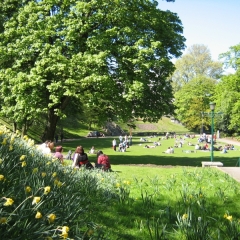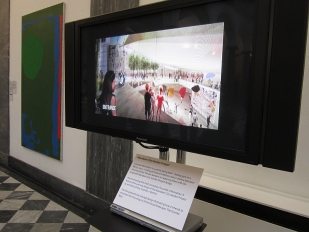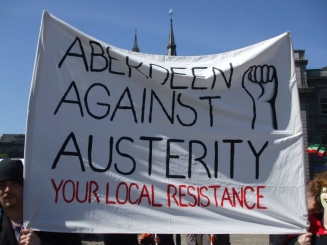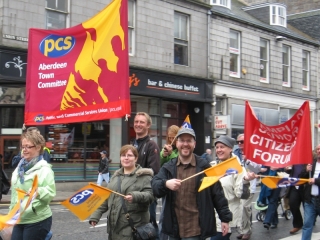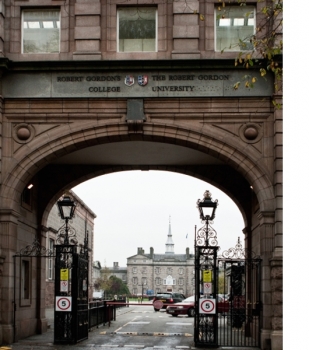Voice’s Old Susannah takes a look over the past week’s events in the ‘Deen and beyond. By Suzanne Kelly.
Tally Ho! This past week there was an astonishingly great fashion show by Gray’s School of Art second and third year fashion students, held in The Seven Incorporated Trades of Aberdeen.
It was professionally organised, smoothly and elegantly run (with a great reception), and the work on show was by any standard advanced beyond the expected level. More on that elsewhere in Aberdeen Voice.
Let’s take a bit of a break from Mr Trump this week I think. Besides which, he’s about to issue writs to the Scottish Government and I’m really scared! If Donald doesn’t want windfarms, Donald will take us to court!
When a law abiding man like that takes legal action, you know he’s not doing it frivolously. I’m sure he’s got a point: hardly anyone’s signing up for golf at Balmedie, and it’s almost as if the 6,000 jobs that were created might be in peril.
This lack of golfers could be due to the sandstorms, hailstorms, rain and cold weather, but far more likely people are staying away in case they’d have to see a wind farm offshore. If I’m going to spend £195 for a round of golf, then have a £100 lunch for two consisting of a few burgers, fries and coffees, I don’t want to be looking at windfarms, either. For that kind of money, I want Led Zeppelin performing live.
I hear the Mayday march might be cancelled this year. Since all of the labour force is now doing so very well under the Coalition Government, the unions decided there is no need for any display. Things are almost as great as when the entire town marched against Kate Dean.
There is also to be a party and events in Union Terrace Gardens that afternoon, but since it is so full of criminals and drug smugglers, I’m sure we’ll all be too afraid to go there. If only we could have had the granite web.
The beautiful granite-clad concrete web may be toast now, but then again, we look set to get some very fetching, brand new glass-box office buildings soon. Really, how do these trendy architects come up with these great designs?
These happening, nearly modern buildings will replace St Nicholas’ House. The complex will blend right into the local architecture of Marischal College and won’t stick out like a dated pastiche predictable cheap sore thumb whatsoever. No doubt these glass box office buildings will look absolutely state-of-the art near the Milne Triple Kirks glass box office buildings and won’t seem old dated and dirty in 3 years or less.
Given the seagull and pigeon populations, this may be a good time to open a window cleaning business.
Norwich decided to encourage some peregrines to nest in their city centre
Speaking of Triple Kirks, poor Stewart certainly has had his difficulties lately. He may have failed to get Scottish football teams to vote with him despite his use of reasoned debate, but at least he showed the city centre wildlife he was boss.
You may remember how Stewart Milne, saviour of Scottish Football and tasteful developer arranged to have the long-settled peregrine falcons ‘discouraged’ from nesting in the Triple Kirks site when he took it over. Well done Stewart.
Unlike clever, business-orientated Aberdeen, Norwich decided to encourage some peregrines to nest in their city centre. The people of Norwich surprisingly find their rare peregrines and the newly-hatched chicks a source of interest, tourism, pride and education as they and the wider world watch the birds on cctv. More info here: http://www.bbc.co.uk/news/uk-england-norfolk-22368516 .
The RSBP believes there are fewer than 1400 breeding pairs in the UK. With as many as that around, it is no wonder the previous Aberdeen City Council administration didn’t discourage Milne from discouraging the birds. We need more office buildings you see.
As there is clearly not enough building work going on to placate important local contractors, some still cling to the possibility of turning Union Terrace Gardens into a parking lot/shopping mall, which we so desperately need. What other explanation is there for the continued existence of the limited company which is the Aberdeen City Gardens Trust?
They’re still listed as an active company at Companies House, with directors Tom Smith, Lavinia Massie and of course Colin Crosby. (I wonder how they managed to get so much positive Granite Web coverage in Chamber of Commerce publications? Perhaps as a board member, Colin could help field the answer to this mystery.) Then again, Colin is also on the Aberdeen Harbour Board, which now seeks to expand into the remaining coastal greenbelt.
An ambitious man, Colin; he’ll make us all rich yet. Well, some of us rich anyway.
Between the ACGT, ACSEF, the Harbour Board, the Chamber of Commerce, Brewin Dolphin, and the board of Robert Gordon’s College, it’s a wonder Crosby hasn’t dropped any balls.
we are all so weak-willed we’ll do whatever is made easy for us to do
For some reason I’m reminded of an episode of Dr Who in which invading aliens try to build monstrosities all over any green space they could all in the name of profit, although I can’t think why that should spring to mind just now.
Yes, it’s men like Colin who disprove the otherwise sound, logical government experiment in Nudge Theory. I’m sure we all know what this important Nudge Theory is, but I’ll get onto it with a definition or two anyway.
Nudge Theory: (modern English jargon phrase) Behavioural theory that people are inherently lazy and need to be pushed into doing what is best for them.
The Nanny State lives on, and thank goodness for that.
It’s like this: only the Colin Crosbys, Stewart Milnes and other rich businessmen aren’t lazy – the rest of us are. Worse, we are all so weak-willed we’ll do whatever is made easy for us to do. This highly-scientific theory is now a government triumph! Result! Not only is it part of the reason the country’s doing so well, but it’s also going to be launched as an initiative!
And you thought there was no good news around.
The BBC covers this marvellous development, and supplies examples of what might otherwise sound like idiotic psychobabble. For instance, if manufacturers put a label on a bottle of wine to the effect that the average person drinks one glass of wine a day, we’ll all follow suit and do just that.
School children will start eating healthier at lunchtimes too. Why? Because we’re going to put the tastier junk food items in locations that are more difficult to reach than healthier options. This logic is brilliant! You can see examples of how this works in the shops today. Since lad’s mags, fags and booze are kept out of reach no one buys them because they’re too lazy to do so.
It’s clear this Nudge Theory is going to take off; it’s so easy to understand.
This scheme is going to make the government millions as well as make all of us safer and less stressed by having to think for ourselves. I personally look forward to having my laziness used to steer me into good behaviour in this subtle manner. It’s not at all Kafkaesque or Orwellian for the government to spend our time and our money on getting us to fall into line and be good.
But the really good news is that this will be a ….
Partnership Model: (modern English jargon) A business entity or company formed by government and private enterprise.
Well, since forming in 2010 the brains behind this great Nudge Theory scheme have really come together to ambitiously turn this scientific theory into a money-spinner. Old Susannah has to wonder if people are inherently lazy, then what sets the people behind this Nudge Theory Partnership Model and their work to go into business with their scheme apart from the rest of us lazy, weak-willed populace.
I guess that they’re just smarter, better, brighter than we are. Only to the worst kind of lazy cynic would this great humanitarian scheme look like a brazen wheeze and ploy to earn money for old and unnecessary rope.
Here’s what the BBC, lazy as they are, were able to find out:-
“It could become the first of “dozens” of elements of Whitehall to be spun out, as Cabinet Office Minister Francis Maude plans to shake-up the Civil Service.
“A spokesman for Mr Maude said: ‘We are in a global race for the jobs and opportunities of the future. To get Britain back on the rise we must find innovative ways to deliver better services more efficiently’. [Old Susannah wonders if Mr Maude was too lazy to make his own statement to the press, and had to be ‘nudged’ into releasing a statement by this spokesman]
“’It’s great news that the world-renowned ‘nudge’ unit is spinning out from central government. As a mutual they will combine the benefits of private sector experience and investment with the innovation and commitment from staff leadership. This accelerates our drive to make public assets pay their way. We hope to support dozens more new spin outs over the next few years. This is a whole new growth area and Britain is leading the way.”
Well, I’m impressed. We’re going to make money out of exploiting people’s natural fecklessness.
The government will join with a private company (no doubt one completely unrelated to any government ministers, tax avoiders or big business interests or lobbyists. Then, they’ll sell the scheme back to the government, which will demand government offices buy into it.
Lazy? I guess you could say fecklessness is off and running as a way to make profits. Or something like that.
Group Four changed to G4S, and did a splendid job running the Olympics
I wonder what this great wheeze will wind up earning for the taxpayer over the years? Undoubtedly we’ll all be better off. Otherwise, they’ll just tell us we’ll be better off, and we’ll be too lazy and/or too stupefied by our one glass of wine a day to bother to find out the real story.
If I could only motivate myself to do some work, or even to open another BrewDog.
Ages ago the Government started privatising everything, and look how well that’s turned out. For instance, Group Four security started running various prison services. These went so well, Group Four changed to G4S, and did a splendid job running the Olympics without any problems at all. Could the government complain if things went wrong?
Not really – the contracts were sewn up very well, government and private sector overlaps tended to help each other out or at least look the other way if problems arose, and lobbyists were always on hand with sweeteners to keep the cogs well oiled. And so it will be with the private/public money-spinning Partnership Model, which will industriously make money out of the fact we the people are lazy.
Nudge Nudge wink wink indeed.
With the Mayday march about to take place, I think we should extend an invitation to the brave, pioneering, hard-working men and women behind Nudge Theory and the Partnership Model to come and join in. I have no doubt that if our teachers, carers, volunteers, firemen, etc. could meet the Nudge professionals, they’d understand just what real hard work is.
I was going to write about the latest in relation to the standoff between the press and the government over press regulation. I was going to write something about Trump, windfarms, and golf, but I realise that I’m just too lazy to do so.
So it’s off to watch some television until I fall asleep, and hope the government will give me some clear pointers on what to do and what not to do, but without me having to even know I’m being steered to do the right thing, as decided by the Nudge Theory think-tank. As long as I don’t have to think too much, or do much, that’ll suit me fine.
Time for my one glass of wine.
Next week – more fecklessness, or possibly some recklessness.
- Comments enabled – see comments box below. Note, all comments will be moderated.



